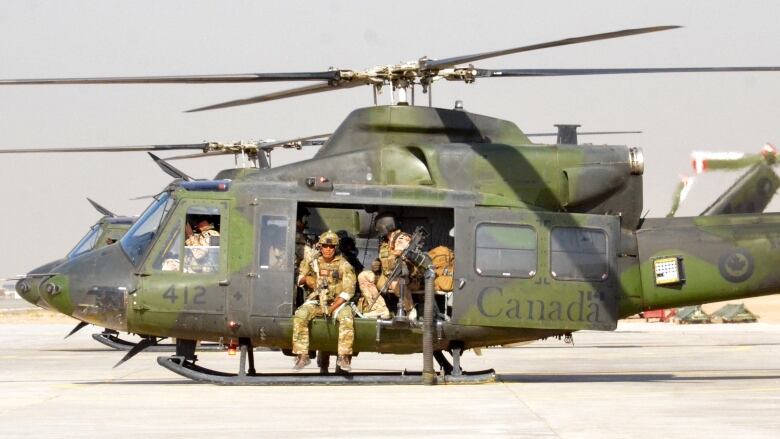Canada sends bomb-clearing engineers to Iraq as ISIS retreat leaves country littered with IEDs
There are between 1,500 and 3,000 ISIS fighters still at large in Iraq and Syria, commander says

Canada is sending 20 combat engineers to train Iraqi troops to dismantle roadside bombs and booby traps left behind by retreating ISIS fighters, the Canadian military announced Friday.
The announcement comes as the overalladvise and assist missioninvolving 200 elite Canadian special forces troopsremains on hold because of tensions between the central government in Baghdad and the independence-minded Kurdish region.
The defeat of Islamic State in Iraq and Syriafighters in the northern Iraq city of Mosula few months ago has left behind tangled ruins littered with improvised explosives.
"There are areas that are heavily polluted by explosive remnants," Brig.-Gen. Dan MacIsaac told CBC News in an interview. "It is appalling. There are vast quantities, and they're intermixed with rubble. The Iraqi people, the Iraqi security forces continue to suffer casualties as there are attempts to resettle people and people attempt to get back to their homes."
The Canadian bomb disposal training, to be conducted in conjunction with other NATO countries, will occurat a base in Besmaya, Iraq, about 45 kilometres from the capital.
It will be carried out,both in the classroom and the field, until the spring next year, MacIsaac said.
The addition of the combat engineers, whose home unit is in Camp Petawawa, Ont., is the latest reconfiguring of Canada's mission in the war-torn country, which began in the fall of 2014 when ISIS extremists overran vast swaths of Syria and northern Iraq.
Mission status
The military also announced Friday that the last CP-140 Aurora surveillance plane will be brought home next month.
Originally two aircraft had been deployed to provide surveillance and targeting locations of ISIS fighters and equipment for warplanes involved in the U.S.-led coalition.
Parliament is on a weeklong break following Remembrance Day, but this latest development is likely to renew questions about the status of the mission involving special forces, which suspended their training of Iraqi and Kurdish forces in the wake of fighting between the two factions.
Iraqi army troops, Iranian-backed paramilitaries and Kurdish fighters had been uneasy allies in the campaign to defeat ISIS, but the alliance has faltered in the aftermath of a resounding independence vote by the semi-autonomous Kurdish regional authority in September.
Ongoing suspension
Canada's special forces do not fall under MacIsaac's command and questions abouttheir mission were referred to the Defence Department, which declined an interview.
The suspension, however, remains in effect, officials confirmed.
"Once more clarity exists regarding the interrelationships of Iraqi security forces, and the key priorities and tasks going forward, the Task Force will resume activities," Dan Le Bouthillier, a spokesperson at National Defence, said in an email.
"In the interim, they will continue to monitor the situation and plan for the next potential phases of operational activity."
Defence Minister Harjit Sajjansaid the bomb disposal training is"a need that was identified some time ago," before violence flared between the various factions.
"We're disappointed solidaritydidn't remain until [ISIS] was completely defeated," Sajjantold CBCRadio's The Houseon the sidelinesof a security conference in Halifax.
Once the Iraqis and the Kurds "work out their internal issues," he said, "we will start our support."
Sajjan said he believes there has been good dialogue and Canada "looks forward to them resolving this as quickly as possible."












_(720p).jpg)


 OFFICIAL HD MUSIC VIDEO.jpg)
.jpg)



























































































